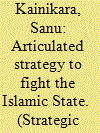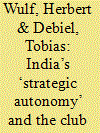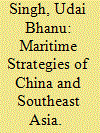|
|
|
Sort Order |
|
|
|
Items / Page
|
|
|
|
|
|
|
| Srl | Item |
| 1 |
ID:
136659


|
|
|
|
|
| Summary/Abstract |
President Barack Obama has detailed his strategy to degrade, defeat and ultimately destroy the Islamic State (IS) (the IS is also referred to as the Islamic State of Iraq and Syria [ISIS]) currently considered the most threatening of the various terrorist groups operating primarily in the Middle East. Fundamental to the success of the strategy is military action aimed at degrading the combat capabilities of the fighting elements of the IS. However, based on previous experience, it is obvious even to the casual observer that military action alone will not bring success in ‘destroying’ the IS as an entity. In fact, going by a number of reports, it seems certain that, unlike other such groups,1 the IS has already gained the trappings of an established state—control of territory, an administrative machinery, tax collection facilities, welfare activities undertaken by a central authority, education systems and an effective if brutal police force. Such an entrenched entity cannot be defeated and made irrelevant by military actions alone.
The group poses a clear threat to all countries in the Middle East, Europe, the US and America’s allies elsewhere. It has been able to gain strength by leveraging the civil war in Syria and exploiting the sectarian divide still very visible in Iraq. The IS has established itself through the use of a potent combination of insurgent, terrorist and conventional military tactics and the vicious use of violence to seize control of large swathes of territory in both Syria and Iraq, as well as weapons and natural resources.
|
|
|
|
|
|
|
|
|
|
|
|
|
|
|
|
| 2 |
ID:
136664


|
|
|
|
|
| Summary/Abstract |
This article examines how the Association of Southeast Asian Nations (ASEAN) conflict management process in the South China Sea (SCS) has been conducted and whether the ASEAN way can effectively manage the dispute, in which China is a prime and important actor. It argues that rising tensions in the South China Sea are a direct result of the changed balance of power in the region given the asymmetry between China and ASEAN members. China has taken advantage of ASEAN efforts to develop a code of conduct that is premised on the ASEAN way.
Introduction
|
|
|
|
|
|
|
|
|
|
|
|
|
|
|
|
| 3 |
ID:
136657


|
|
|
|
|
| Summary/Abstract |
India, the IT nation, did not make a news splash at CyberTech 2014. That is worth a passing thought. Because cyber is the fifth and new domain of warfare, after land, sea, air and space.
CyberTech 2014 took place in Tel Aviv in January, and displayed Israel’s prowess in cyber-defence. Israel’s National Cyber Bureau, which played a major role in organising the event, defines its goals as drawing up cyber-defence policies, developing cybersecurity legislation and turning Israel into a global cyber incubator. The Israelis say that as hackers keep getting more sophisticated, the brightest digital security minds from around the world will need to come together. And CyberTech 2014 did do that, bringing together some 500 heads of industry, representatives of cybersecurity agencies from across the world, as well as a large US delegation from the White House and their Department of Homeland Security. Many agreed that Israel’s experience in foiling thousands of cyber-attacks each day and the quality of their cyber start-ups could be very lucrative for business within and outside its
|
|
|
|
|
|
|
|
|
|
|
|
|
|
|
|
| 4 |
ID:
136660


|
|
|
|
|
| Summary/Abstract |
With the Bharatiya Janata Party (BJP)-led coalition coming to power in India in May 2014, the issue of illegal immigration from Bangladesh has come to the forefront once again. However, the fear is whether the debate over the issue will shed more light, leading to the resolution of the problem, or whether it will simply degenerate into political rivalry and polarisation. Illegal immigration figured prominently in the run-up to the 2014 parliamentary elections and was often raised by one of the leading political parties, the BJP. No doubt, flagging this important issue was reflected in the improved political fortunes of the party. Meanwhile, some new facts have also emerged that have brought the issue of illegal immigration out from the realm of speculation and given some shape to the problem. These facts indicate that, if anything, the problem has worsened in the last 10 years. There is now a greater need for political parties to work together for a meaningful solution.
|
|
|
|
|
|
|
|
|
|
|
|
|
|
|
|
| 5 |
ID:
136658


|
|
|
|
|
| Summary/Abstract |
Germany, located in Central Europe, has access to different national and international river basins and lakes, including the Rhine, Elbe, Danube and Lake Constance. Precipitation in Germany differs between comfortable amounts in the Alpine region (1500–2000 mm/a) to moderate amounts in the central and northern regions (600–800 mm/a). In brief, the geological conditions are in favour of successful groundwater storage.
High population density, industrial production and intensive agriculture pose challenges to efficient water management. Irrigation is low but moderately increasing. More or less the same is true for river basin neighbours such as France, Switzerland, Austria, Benelux, Poland and the Czech Republic. The lower Danube countries are industrial but less developed. Thus, the surface and groundwater is under moderate quantitative pressure. Nevertheless, water management is needed for flood risk and low-level water.
|
|
|
|
|
|
|
|
|
|
|
|
|
|
|
|
| 6 |
ID:
136666


|
|
|
|
|
| Summary/Abstract |
This paper seeks to explain the domestic sources of Indonesia’s foreign policy under
SBY’s presidency. It delineates two aspects of Indonesian foreign policy: the enabling
environment that creates opportunities for SBY to pursue a more active participation for Indonesia in many international fora; and the structure and actors that in the past 10 years of Indonesia’s democratic experience have expanded beyond the small circle of elites concerned with foreign policy. This paper suggests that democratization affects Indonesia’s foreign policy establishment in a number of ways. First, political reform that comes as a logical consequence of democratization triggers reform in the heart of foreign-policy making arena. Second, the parliament has also emerged as a new power equipped with some Constitutional rights-to oversee the conduct of Indonesia’s foreign lions. Third, democratization and the political 4 RM it has brought complicate the process of foreign policy making.
|
|
|
|
|
|
|
|
|
|
|
|
|
|
|
|
| 7 |
ID:
136663


|
|
|
|
|
| Summary/Abstract |
The growing international influence of so-called emerging powers has had a major impact on global governance, leading to new challenges for established and emerging powers alike. This contribution outlines the expectations of established powers and the debates on the state of global governance in the field of International Relations, as well as the positions and policies of emerging powers. An analysis of the fields of TRADE and climate policy highlights the resilience of established powers and reveals that emerging powers, despite their declared reluctance, have actively participated in global governance to pursue their interests. While cooperation is difficult, confrontation is not inevitable.
|
|
|
|
|
|
|
|
|
|
|
|
|
|
|
|
| 8 |
ID:
136661


|
|
|
|
|
| Summary/Abstract |
India’s global policy strategy is on the verge of major changes. Non-alignment as a cornerstone of foreign policy has become outdated given the power shifts in a multipolar world, especially through the emergence of BRICS (Brazil, Russia, India, China, South Africa), which has put India in the position of being perceived as a potential new global player. Without formulating an explicit doctrine, India has applied a three-fold approach with obvious inconsistencies: traditional multilateralism in global forums, bilateralism in the region with selected strategic partners and increasing involvement in clubs (such as BRICS). The most recent power shifts, however, will warrant a more explicit formulation of principles to clearly position the country in a world with self-assertive nations such as China and Russia. India’s role in BRICS might be an indicator as well as a litmus test for a revised strategy.
|
|
|
|
|
|
|
|
|
|
|
|
|
|
|
|
| 9 |
ID:
136665


|
|
|
|
|
| Summary/Abstract |
Maritime security in the Indo-Pacific (or the Indian Ocean–Pacific Ocean continuum) has acquired salience following the shift of the centre of gravity from the Atlantic. It has brought the focus onto the TRADE, resources and energy lifelines that run across it. The emerging power equations marked by an assertive China, a rising India, a resurgent Japan, together with a rebalancing United States make for a potentially turbulent region. The resultant situation has thrown up new challenges and opportunities which are compounded by the traditional and non-traditional threats that plague the region. The regional states’ response to the evolving strategic environment in the Indo-Pacific (which includes China’s growing naval power) has manifested itself in individual maritime strategies. As it happens, these maritime strategies are as much affected by the process of norm making currently underway as by China’s growing naval assertiveness.
|
|
|
|
|
|
|
|
|
|
|
|
|
|
|
|
| 10 |
ID:
136662


|
|
|
|
|
| Summary/Abstract |
After nearly 30 years in power, the Hosni Mubarak regime in Egypt, considered by many to be the strongest in the Arab world, collapsed suddenly in February 2011 after a mere 18 days of street protests. In this article, we try to explain the puzzling collapse of the Mubarak regime using regime transition theory. We argue that the Mubarak regime’s collapse came about as a result of four key developments, none of which were sufficient to cause the regime’s collapse, but when coalesced together exposed the regime’s lack of coercive and persuasive powers, thereby hastening its demise. We conclude that regime transition theory, developed to explain the third wave of democratisations in the 1970s and 1980s, is still relevant in explaining transitions from authoritarian rule.
|
|
|
|
|
|
|
|
|
|
|
|
|
|
|
|
|
|
|
|
|